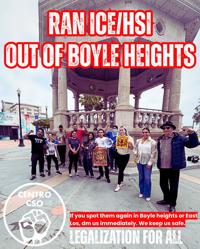
With ramped-up immigration crackdowns and deportations since January, what rights do Americans have to help undocumented immigrants?
The major federal law codifying U.S. provisions concerning this — the Immigration and Nationality Act of 1952 (INA) — prohibits harboring unauthorized immigrants, but there is no nationwide, Supreme Court consensus as to what harboring means.
While the INA defines harboring as actions that “ to substantially facilitate the alien remaining in the United States illegally,” for instance, would this include giving an immigrant money for a bus to their target city as much as it would include housing them?
“Most of our immigration laws, as we have found brutally up until now, are pretty laissez faire. The fact that we have 11.7 million unauthorized people in the country must mean that we don’t enforce laws so universally. That’s reality. You can’t hide from that,” explained Muzaffar Chishti, senior fellow at the Migration Policy Institute and director of the MPI office at the New York University School of Law, in an interview with American Community Media.
“Different administrations obviously have different attitudes as to what gets you removed, apprehended, detained and deported from the United States,” he continued. “Under the first Trump administration, Attorney General Sessions made no secret of zero tolerance toward smuggling and harboring people at the border … so there’s an expectation this’ll go up hugely now under Holman.”
Under Sessions, harboring-related charges filed by the first Trump administration spiked from less than 3,500 in 2015 to approximately 4,500 in 2018 and an all-time high of just under 5,700 in 2019 — a nearly 65% increase over the four years.
“They are going to prosecute more people for harboring, and one reason why is that their goal of mass deportation of 1 million people a year is unlikely to materialize. They’re not even outperforming Biden … and now they’re facing lawsuits and uncooperative judges,” said Chishti.
An Immigration and Customs Enforcement (ICE) report published in mid-March shows that Trump’s daily removals from January 26 through March 8, 2025 averaged 661 — 10.9% lower than Biden’s daily average of 742 for 2024.
As of May, Trump’s use of executive power in areas including immigrant extraditions, legal status revocations, DEI bans and press restrictions has spawned at least 328 lawsuits nationwide.
“So if the numbers are not going to come from deportation, they want people to self deport … through fear: ‘My God, if I’m harboring my partner or my employee or my neighbor, would I become the target?’” Chishti said. “But as to what harboring actually means, the case law is all over the place.”
While some courts, like the Third Circuit, define harboring as an illegal offense broadly as “providing shelter, transportation, direction about how to obtain false documentation, or warnings about impending investigations that facilitates a person’s continuing illegal presence in the United States,” others like the Sixth and Ninth Circuits define it more restrictedly as literally shielding or affording shelter to an immigrant.
“If it’s a situation like your partner just staying with you or you transporting them somewhere already in the country, it’s unlikely to lead to a charge. But if you take them over the border, or to a facility to get a fake green card, or if ICE shows up and you prevent them from being detected, that would rise to harboring,” explained Chishti.
As for work, “if you are employing someone without knowing that they’re unauthorized, that would not be harboring,” he continued. “But if you’re found knowingly hiding it … or if you help them fill an I-9 form when they show you false documents, that’s harboring, because you’re directly facilitating the unlawful stay of the person in the country.”
He noted that “At the end of the day, it’s really going to be determined by how much resources each jurisdiction has in prosecuting these people. It’s an opportunity cost: If they prosecute someone who gives a lift to someone, what are they not prosecuting?”
In late May, for instance, a Harris County, Texas sheriff said a bill requiring state sheriffs to help ICE enforcement would cost “well over $1 million.”
“If you see a sick person by the road, do you have an obligation to ask them first whether they’re authorized?” asked Chishti. “One way to put this is whether being a good Samaritan is being criminalized.”
In 2018, under the first Trump administration, a college teacher and humanitarian volunteer was arrested and charged with two counts of felony harboring and one count of conspiracy for giving food, water and shelter to two unauthorized migrants along the border.
He was acquitted after challenging what he called the government’s “attempt to criminalize basic human kindness” and invoking the Religious Freedom Restoration Act 1993, on the grounds that his religious beliefs motivated him to help the migrants.
In 2019, a Texas city attorney was arrested and detained for stopping to phone for medical attention for three dehydrated young migrants limping along a roadside.
“Reasons for a ‘don’t ask, don’t tell’ policy in institutional behavior are becoming more prevalent,” said Chishti. “In schools, this looks like teachers wanting parents not to tell them anything about their kids. It’s about whether telling the hospital essential information about you creates an obligation to call ICE, because if they don’t, they could be accused of harboring. It looks like not showing up to your own court hearing.”
“If there is a need to know less and less, you can imagine what less engagement in the lives of those most vulnerable does to the social fabric,” he added. “The chilling effect of this, at some level, is much longer-lasting than actual enforcement.”











(0) comments
Welcome to the discussion.
Log In
Keep it Clean. Please avoid obscene, vulgar, lewd, racist or sexually-oriented language.
PLEASE TURN OFF YOUR CAPS LOCK.
Don't Threaten. Threats of harming another person will not be tolerated.
Be Truthful. Don't knowingly lie about anyone or anything.
Be Nice. No racism, sexism or any sort of -ism that is degrading to another person.
Be Proactive. Use the 'Report' link on each comment to let us know of abusive posts.
Share with Us. We'd love to hear eyewitness accounts, the history behind an article.